
Witness to solidarity
He stood on the side of the most marginalized people and supported their efforts to improve their lives
By Marielle Murphy
January/February 2008
Return to Table of Contents
Print Article
There's a picture that has sat on the mantel in my parents' home for more than 22 years. It shows Fr. Lou Quinn, my parents, my sister and me at my cousin's home in the capital city of Santo Domingo during the spring of 1985. We were there after spending a couple of months with my family in the town of San José de Ocoa, including daily visits to the casa curial (parish house). As a playful and adventuresome five-year-old, I remember accidentally locking Fr. Lou out of his house.
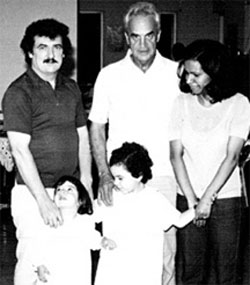 Marielle Murphy, her younger sister Danielle, and her parents Dan and Mara visiting with Fr. Lou Quinn (centre) in San José de Ocoa, Dominican Republic. (1985). Dan Murphy, a former Scarboro missioner, served with Lou in the Dominican Republic in the 1960s and 70s.
Marielle Murphy, her younger sister Danielle, and her parents Dan and Mara visiting with Fr. Lou Quinn (centre) in San José de Ocoa, Dominican Republic. (1985). Dan Murphy, a former Scarboro missioner, served with Lou in the Dominican Republic in the 1960s and 70s.
I spent many summers in Ocoa and grew up knowing Fr. Lou, Sarita and Diana, his housekeepers, as a second family. As a little girl, I remember riding with Fr. Lou up the winding rural mountainside to reach the more remote communities (campos) of Ocoa. Along the way, children would come running barefoot from their tin and wood homes, calling his name. Fr. Lou would stop and reach beside him on the truck seat to grab a few of the balloons that he always carried with him. While inflating the balloons he asked them about school and their families. Then he tossed the balloons toward the children who ran after them screaming with laughter.
I remember the feeling of excitement when I heard the sound of his truck pull up to my grandma's house. He would be coming for a visit or to take us on a trip up to the campos. In later years he was accompanied by his assistant Josee.
The campos are where Fr. Lou came alive. He would make his way up the familiar winding mountain roads, all the while talking non-stop about the latest projects in the area and the socio-economic decisions being made on a national and international level, decisions that harshly impacted the lives of the struggling campesinos. Fr. Lou's spirit was inexhaustible and contagious as he worked creatively and tirelessly to improve the social and economic conditions of Ocoa.
Decades ago the town received a donation of a bulldozer, which they desperately needed to create the roads that would connect them with other communities. However, the bulldozer arrived in various pieces and Fr. Lou without hesitation rolled up his sleeves and figured out how to put the machine together with his own hands. Fr. Lou's hands have built thousands of schools, clinics, roads, homes and irrigation systems. His hands have strummed the guitar, singing songs he wrote about the importance of solidarity and justice. The same hands have personally greeted Dominican presidents, Canadian prime ministers, and international ambassadors, and have held the rough, earth-scented hands of the farmers and families living on the mountainsides in Ocoa.
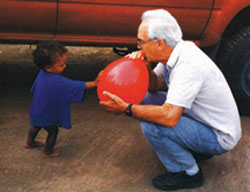 The children of the campos (mountain communities) eagerly looked forward to Fr. Lou's visits and his seemingly neverending supply of balloons.
The children of the campos (mountain communities) eagerly looked forward to Fr. Lou's visits and his seemingly neverending supply of balloons.
Fr. Lou knew education was a two-way conversation, which is why during his sermons, he would take a microphone to the people sitting in the pews and ask them their opinions. Youth in Ocoa were encouraged to question and seek answers to the issues they faced in their daily lives. And even though I've had the benefit of being taught by university professors, without a doubt, Fr. Lou was also my greatest teacher. He taught me the difference between having a moral compass and a moral "drive". It is not enough to recognize the injustices in this world, he said. One must also consistently act in a fashion that works toward the development of the most marginalized communities. He also taught me that the Catholic faith comes to life when you stop to converse and share with your brothers and sisters. It is probably the same reason why Fr. Lou's living room was simply a circle of rocking chairs, surrounded by more than 40 years of photos he had taken of life in the rural mountainside of Ocoa.
Fr. Lou's message was one of social and economic justice for everyone. His work over the years is a model of community development.
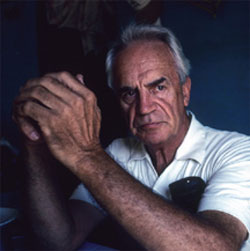
FR. LOU'S HANDS HAVE BUILT THOUSANDS OF SCHOOLS, CLINICS, ROADS, HOMES AND IRRIGATION SYSTEMS. HIS HANDS HAVE STRUMMED THE GUITAR, SINGING SONGS HE WROTE ABOUT THE IMPORTANCE OF SOLIDARITY AND JUSTICE.
On Wednesday, October 17, thousands of farmers, teachers, mothers, and young students gathered at the entrance to Ocoa. For days, people had been streaming into the town, many making the trip from their remote communities, to celebrate the life of their beloved "Padre Luis" and to accompany him in his final journey to the town's Church of Altagracia. On October 19, the community of Ocoa buried their "Father" at the entrance to their church in a simple pine box that they had made.
Ocoa can take comfort in the fact that Padre Luis's touch is all around them – in the clinics, schools and roads where he has left his mark. As he sang in one of his songs:
"Life goes on. Works remain. Some may have to leave, but others will continue the work. La vida sigue igual."
The greatest tribute to Fr. Lou's life is that there are thousands of men and women in Ocoa to continue his work. Men and women who were given the chance to grow up healthy, to have an education and to provide for their communities because of the efforts of their Padre Luis.
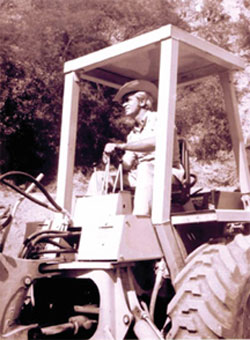 The work of development in Ocoa was the people's work and Fr. Lou was always ready to support their efforts in any way, even assembling and driving the bulldozer in the building of thousands of miles of mountain roads.
The work of development in Ocoa was the people's work and Fr. Lou was always ready to support their efforts in any way, even assembling and driving the bulldozer in the building of thousands of miles of mountain roads.
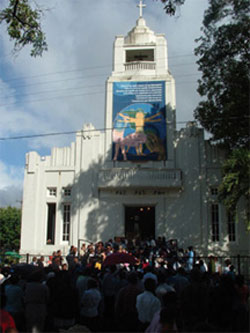 The Church of Altagracia, parish church of Ocoa, pastored by Fr. Lou Quinn since 1965.
The Church of Altagracia, parish church of Ocoa, pastored by Fr. Lou Quinn since 1965.
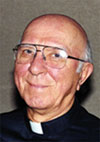
A vision of integrated development
Scarboro missionaries first went to San José de Ocoa in 1943 and quickly became involved in what we know today as "development." In the early 1960s Scarboro missioner Fr. Joe Curcio started the St. Vincent de Paul Society in the town. The group worked to help victims of a powerful hurricane that struck the Ocoa region. From this work, Fr. Curcio and members of the St. Vincent de Paul, together with other Ocoans, then went on to form an association known as ADESJO (Association for the Development of San José de Ocoa). This civic organization was inactive during a time when the country was in the grip of a civil war. Fr. Lou Quinn returned to the Dominican Republic in 1965 after taking courses in cooperatives and community development at the Coady Institute in Nova Scotia. As pastor of the parish of Ocoa, he re-mobilized ADESJO, putting himself firmly on the side of the men and women who were working to better the lives of the people.
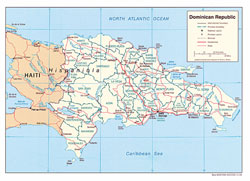 Today the population of San José de Ocoa, capital city of the province of San José de Ocoa, is 34,478 (21,226 urban and 13,252 rural).
Today the population of San José de Ocoa, capital city of the province of San José de Ocoa, is 34,478 (21,226 urban and 13,252 rural).
The ADESJO website writes: "The Association for the Development of San Jose de Ocoa began in July 1962 as a small group of men and women who with the support of the local parish began to give workshops on community development and cooperative organizing. Since its inception, this non-profit organization has accompanied the most marginalized populations in their search for sustainable economic alternatives.
"ADESJO's vision of holistic development includes providing all citizens with the possibility of a dignified life. Through participation, organization, technical support, planning tools, project proposal workshops and training, ADESJO strives to make each community self-sustainable and the director of its own destiny.
"Community participation is at the heart of all that ADESJO does. Each project, whether it be planting crops or building a house, is carried out by committees formed by neighbours – men and women, singing and working alongside each other in traditional Dominican solidarity."
Return to Table of Contents
Print Article